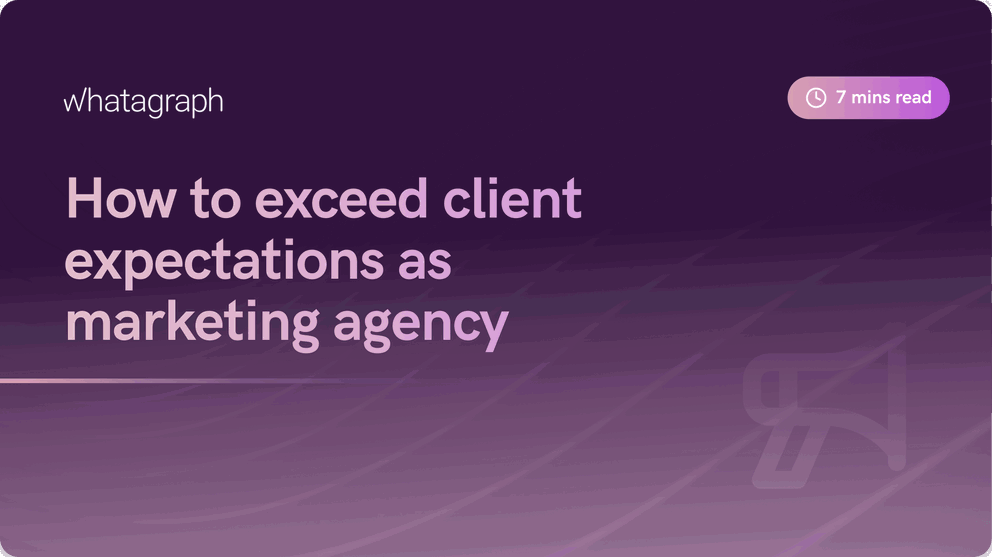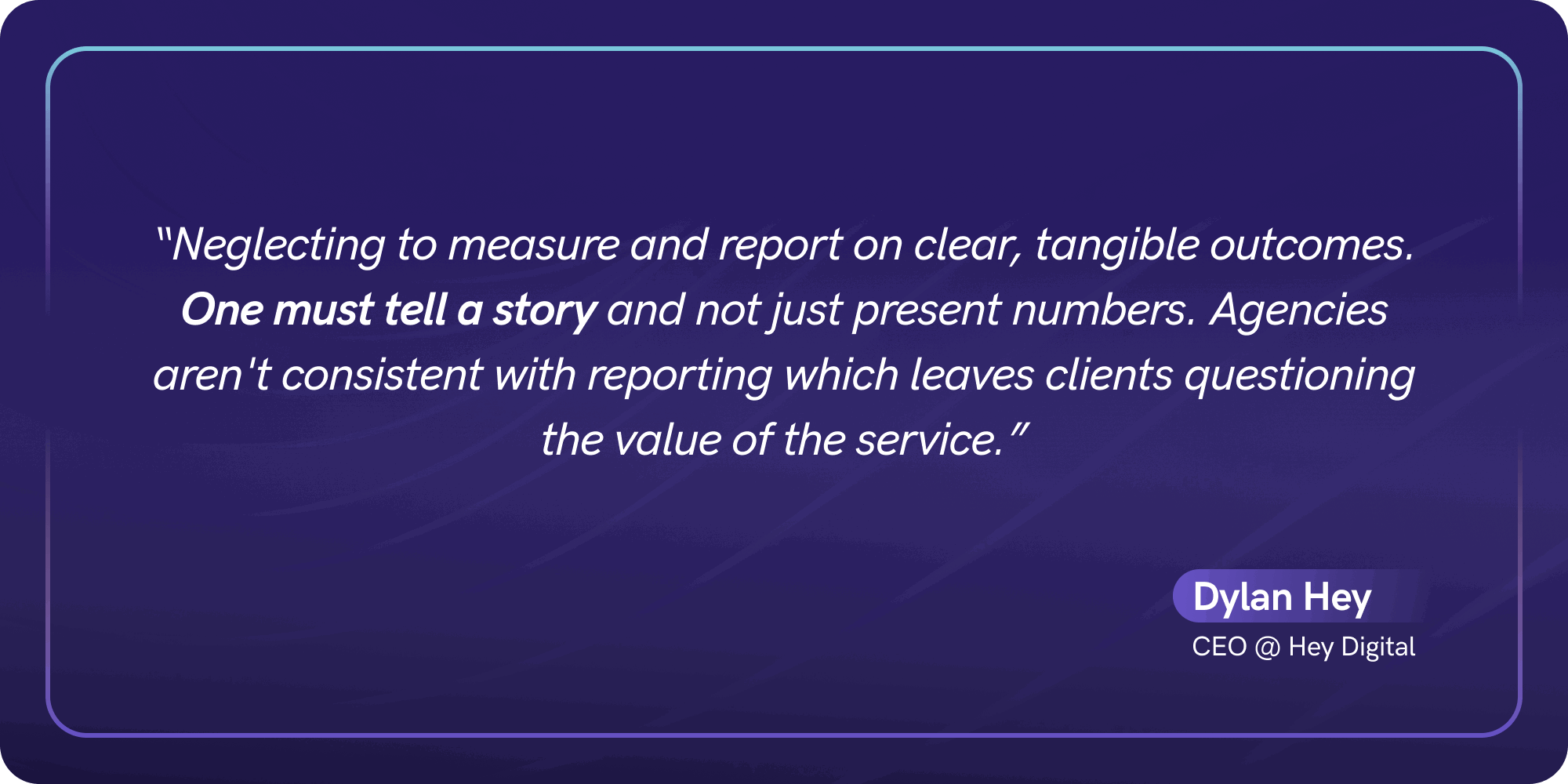How to Exceed Client Expectations as Marketing Agency
As agencies strive to differentiate themselves and deliver exceptional value, exceeding client expectations becomes not a goal but a necessity. From understanding client needs and preferences to delivering innovative solutions and measurable results, exceeding client expectations has several layers that need attending to.

May 23 2024●7 min read

In this comprehensive guide, we'll explore the strategies, tactics, and best practices that marketing agencies can employ to surpass client expectations and drive long-term success.
We also collected insights from industry experts who uncover their keys to building strong, lasting relationships with clients and delivering outstanding results that go above and beyond expectations.
Understand client expectations
Several factors can influence client expectations in the marketing agency-client relationship. These factors can vary based on each client's specific needs, preferences, and objectives, as well as the dynamics of the client-agency relationship. Some key factors that may influence client expectations include:
Industry knowledge and expertise: Clients often expect their marketing agency to have a deep understanding of their industry, including market trends, competitive landscape, and consumer behavior. They may expect the agency to leverage this knowledge to develop tailored strategies and campaigns that resonate with their target audience and drive results.
Consistent quality work and deliverables: Clients expect high-quality work and deliverables from their marketing agency, whether it's creative content, digital assets, or strategic recommendations. They may have specific standards and expectations regarding the aesthetic appeal, functionality, and effectiveness of the agency's output.
Innovation and creativity: Clients often look to their agency partners for fresh ideas, innovative solutions, and creative approaches to marketing challenges. They expect agencies to stay ahead of the curve, embrace new technologies and trends, and push the boundaries of creativity to stand out in a competitive marketplace.
Results and ROI: Ultimately, clients expect their marketing agency to deliver tangible results and a positive return on investment (ROI) for their marketing efforts. Whether it's increased brand awareness, lead generation, or revenue growth, clients want to see measurable outcomes that align with their business objectives.
By understanding and addressing these factors that influence client expectations, marketing agencies can better meet their clients' needs and preferences, foster stronger relationships, and ultimately drive greater success and satisfaction in their client engagements.
Set the foundation for success
Setting a healthy base for success in agency-client relationships from the early stages is crucial for building trust, alignment, and collaboration. Here are some steps to establish a strong foundation for success:
- Understand client needs and objectives: Take the time to thoroughly understand your client's business, industry, target audience, and marketing goals. Conduct comprehensive discovery sessions, interviews, and research to gain insights into their challenges, opportunities, and expectations.
- Establish clear communication channels: Define how communication will be conducted, including preferred methods (e.g., email, phone, meetings), frequency of updates, and escalation procedures for urgent matters. Ensure that both parties have access to the necessary contact information and resources to facilitate effective communication.
- Set expectations and define roles: Outline each party's roles, responsibilities, and expectations to minimize misunderstandings and prevent scope creep. Document these agreements in a formal contract or statement of work to provide clarity and accountability for both parties.
- Develop a strategic plan: Collaborate with the client to develop a strategic plan that outlines the overarching marketing strategy, objectives, tactics, and KPIs. Align the plan with the client's business goals and target audience to ensure relevance and effectiveness. Incorporate feedback and insights from both parties to create a comprehensive roadmap for success.
- Provide onboarding and orientation: Offer a structured onboarding process to introduce the client to your agency's team, processes, and services. Clarify expectations, address any questions or concerns, and ensure that clients feel supported and informed as they transition into the partnership.
By taking these proactive steps to set the foundation for success in agency-client relationships from the early start, marketing agencies can build strong, lasting partnerships based on trust, alignment, and collaboration. This sets the stage for productive collaboration, effective communication, and ultimately, the achievement of shared goals and objectives.
Top strategies for exceeding client expectations
Let's delve into actionable tactics and best practices that agencies can implement to surpass client expectations and drive unparalleled success.
1. Proactively communicate
Being proactive in suggesting optimizations and new strategies shows that the agency is committed to continuous improvement and delivering long-term value. We call that "advisory value" and we believe it is what separates us from other commoditized agencies.
Dylan Hey - CEO @ Hey Digital
By building trust, effectively managing expectations, strengthening collaboration and engagement, addressing issues promptly, and providing value-added services, agencies can foster strong, lasting relationships with clients and drive unparalleled success.
- Maintain open lines of communication and provide regular updates on project progress. Having an automated reporting solution that keeps clients up to date with the current developments is a huge advantage.
- Proactively identify opportunities for improvement and innovation to add value to client projects. By sharing industry trends, best practices, and strategic recommendations, agencies can demonstrate their expertise and add value beyond the scope of the initial engagement.
- Anticipate potential issues or concerns and address them before they become problems. By identifying potential challenges early on and communicating openly with clients about possible solutions or mitigations, agencies can minimize disruptions and keep projects on track
2. Provide exceptional service
I’ve heard a lot of stories from our clients who were at other agencies before, but where they’ve left because they were being consulted by junior people while they were being told they were getting consult from seniors.
Lars Maat - Owner @ Maatwerk
Exceptional service goes beyond assigning clients to competent consultants. When clients receive prompt, attentive, and personalized service, they feel valued and reassured that their needs are being prioritized.
- Deliver high-quality work that exceeds client standards and expectations. Agencies that consistently meet or exceed expectations in terms of deliverables, timelines, and performance metrics demonstrate their reliability and competence.
- Go above and beyond to address client needs and preferences. Whether it's offering strategic advice, sharing industry insights, or providing additional resources, agencies can demonstrate their commitment to client success and exceed expectations by providing value that goes above and beyond the initial engagement.
3. Deliver measurable results
Agencies must learn to provide in-depth monthly reporting that clearly demonstrates performance metrics, revenue impact, and return on investment. Your client needs to be informed of all this and not just random metrics that would make sense only to a marketer.
Dylan Hey - CEO @ Hey Digital
Clients engage marketing agencies with the expectation of achieving specific outcomes, whether it's increased brand awareness, lead generation, or revenue growth. Exceeding these expectations by achieving or surpassing agreed-upon goals enhances client satisfaction and reinforces the agency's credibility.
- Set realistic goals and benchmarks for success. When clients compare the performance of different agencies, they are more likely to choose the one that consistently delivers results and demonstrates a strong ROI. This competitive advantage enhances the agency's reputation and attracts new clients seeking similar success.
- Deliver measurable results that align with the client's objectives to demonstrate your agency’s value and effectiveness.
- Use data and analytics to measure performance and demonstrate tangible results to clients. When choosing the best way to demonstrate results to clients, you should consider a reporting platform that makes insights easy to understand even for non-marketers and keeps them engaged with stunning visuals.

4. Provide strategic guidance
Adopting a solely campaign-level operating falls short, since the partner, in this case, takes on an executor role rather than fulfilling the client’s expectation for an agency to act as a consultant or strategist, too. Therefore, a profound understanding of client’s business and the ability to match campaign insights with a wider scope perspective is a skill for agencies to work on to improve their client retention.
Ieva Masaitytė - Client Director @ Dentsu
This kind of strategic foresight enables the agency to add value by positioning the client for long-term success and exceeding expectations with forward-looking solutions.
- Offer strategic insights, recommendations, and guidance to help clients achieve their business objectives. By sharing best practices and innovative ideas, the agency demonstrates its expertise and commitment to helping clients navigate complex business challenges and achieve their goals.
- Become a trusted advisor and partner in the client's journey towards success. Strategic guidance goes beyond addressing immediate challenges to anticipating future needs and opportunities for the client.
- By leveraging industry expertise, market insights, and forward-thinking analysis, the agency can provide proactive guidance on emerging trends, potential risks, and strategic opportunities that may impact the client's business.
5. Make continuous improvements
By automating our data collection and reporting, we have not only made our own operations more efficient, but above all improved our customers' access to information. They can now benefit in real time from deeper insights presented in a clear and user-friendly way. We can now together make faster and even better decisions!
Andreas Sandgren - CEO @ Market Solutions
Continuous improvement is essential for marketing agencies to exceed client expectations and maintain a competitive edge in the industry. Here are several areas where agencies can focus on continuous improvement:
- Regularly solicit client feedback through surveys, meetings, and reviews to understand their evolving needs, preferences, and satisfaction levels. Use this feedback to identify areas for improvement and make necessary adjustments to enhance the client experience.
- Continuously evaluate and refine the agency's service delivery processes to ensure efficiency, effectiveness, and quality. Monitor key performance indicators (KPIs) related to service delivery, such as turnaround times, error rates, and client satisfaction scores, and identify opportunities for improvement.
- Stay abreast of advancements in marketing technology and tools that can streamline processes, improve productivity, and enhance results. Continuously evaluate and adopt new tools and platforms that align with the agency's goals and client needs. Invest in professional development and stay informed about industry trends and best practices through webinars and events.
- Establish robust performance measurement frameworks and analytics systems to track the effectiveness of marketing campaigns and initiatives. Continuously analyze and optimize campaign performance based on data insights and client feedback to drive better results and exceed expectations.
By prioritizing continuous improvement in these areas, marketing agencies can exceed client expectations, drive long-term success, and position themselves as trusted partners for their clients.
Conclusion
Throughout this article, we've expanded on expert tips and best practices for exceeding clients' expectations as a marketing agency. These insights offer a roadmap for elevating the client experience to new levels.
But exceeding client expectations isn't just about meeting predefined metrics or deliverables — it's about going above and beyond to anticipate needs, exceed benchmarks, and create measurable outcomes that propel businesses forward.
Find more client success tips, expert guides, and resources on our Agency Hub page.

WRITTEN BY
Nikola GemesNikola is a content marketer at Whatagraph with extensive writing experience in SaaS and tech niches. With a background in content management apps and composable architectures, it's his job to educate readers about the latest developments in the world of marketing data, data warehousing, headless architectures, and federated content platforms.